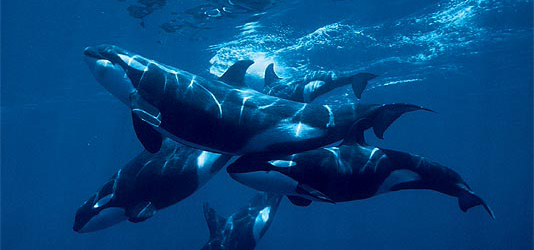Hot Flash, Cold Ocean: Orcas Go Through Menopause, Too
so long and thanks for all the fish

Humans are weird. Scientifically speaking (as well as in other ways…you saw that cat video, right?), we house a collection of evolutionary traits that are shared by few, or sometimes no, other animals on the planet. One of the weird things that we do, besides have sex that’s not about procreation at all (shared by close primate relatives like the bonobo, and dolphins, those scamps), is that our females have menopause.
And so, it turns out, do killer whales.
Menopause, while a relief for some, and a tumultuous life change for others, is an odd thing, when you think from an evolutionary biologist’s perspective. As Discover Magazine has pointed out in their fascinating article on this rare cross-species specialty, it would seem to make no sense for an animal to have a reproductive cutoff that is relatively early in their overall life span. Yet, like everything else in evolution, there must be a reason, either derived from social or physical lifestyle, that menopause developed.
A lot of the plausible reasons behind this shared trait can be inferred by looking at similarities between the species. We don’t live in the ocean, but until recent history many humans, just like killer whales, or orcas, and pilot whales, who also have a long menopausal period, remained in the close-knit communities they were born into. Orcas stay with their pods, and, in fact, hit menopause earlier than most humans, in their 30s or 40s, though, like us, they can live into their 90s. So, the question remains of what the benefits might be to having an older female whale stick around after she stops having kids.
According to studies conducted by Emma Foster, of the University of Exeter, a grandmotherly whale who helps out can make a huge difference in the health of a pod, a difference that can mean life or death. Drawing on data gathered by scientists in the Pacific Northwest like Mike Biggs and Ken Balcomb, who have tracked individual whales and deduced familial patterns, Foster has been able to posit some conclusions about these older female whales. Her research has found that,
It’s clear that mothers who had been through menopause were just as useful to have around, and probably more so, than those who are still fertile. On average, a 30+ male is 8 times more likely to die in the next year if his mother passes away, but his odds actually go up by 14 times if mum had gone through menopause. This confirms that mothers are helping their sons well into adulthood, since older orcas actually benefit from mum’s presence more than young ones. Perhaps she helps them to hunt, or maybe she watches their backs during fights with rivals.
Go Grandma Orca!
Orca data is difficult to gather, with pods hard to track even through conventionally reliable means. But a fascinating trend that Foster and colleague Michael Cant noticed in the records was that whale daughters don’t need their mothers around nearly as much as the sons seem to in later years. From the perspective of a pod’s organization, this makes a lot of sense. Because orcas mate outside of their own pods, but babies stay with the pods of their mothers, a grandma orca who wants to get her DNA spread as widely as possible and wants to lessen the competition for resources within her own pod will do her best to make sure her sons grow up and get laid.
So, next time your kids protest those visits from grandma, tell them about orca grandkid survival chances. Science is on your side.
Read the full report for more interesting stats and analysis.
(via Discover Magazine)
Have a tip we should know? tips@themarysue.com